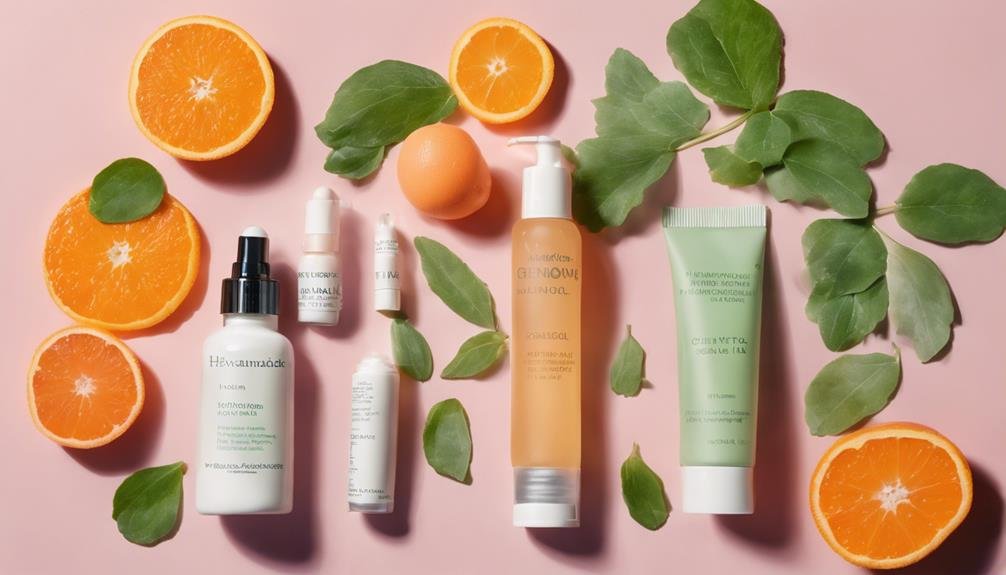Embark on a journey towards achieving skin that reflects your inner vitality and well-being. Discover the secrets to unlocking your skin's natural glow and vitality with a holistic approach to skincare. From understanding your skin's unique needs to harnessing the power of targeted treatments, this guide will equip you with the knowledge and tools necessary to transform your skin health. Unlock the potential for radiant and healthy skin as we delve into the essential steps and practices that will elevate your skincare routine to the next level.
Key Takeaways
- Identify skin type to choose appropriate products.
- Follow a daily cleansing routine with suitable cleansers.
- Incorporate exfoliation techniques based on skin type.
- Prioritize hydration and moisturization for healthy skin.
- Always use sun protection to prevent skin damage.
Skin Type Identification
Identifying your skin type is the crucial first step in establishing an effective skincare routine tailored to your specific needs. There are generally four main skin types: normal, dry, oily, and combination.
Normal skin is well-balanced, not too oily or dry, with small pores and few skin issues.
Dry skin often feels tight, may be flaky, and lacks moisture.
Oily skin tends to be shiny, with larger pores and a higher likelihood of acne.
Combination skin is a mix of oily and dry areas, commonly an oily T-zone (forehead, nose, and chin) with dry cheeks.
To determine your skin type, observe how your skin feels throughout the day and after cleansing. Pay attention to factors like oiliness, dryness, sensitivity, and pore size. Consulting a dermatologist can also help pinpoint your skin type accurately. Understanding your skin type is essential for choosing appropriate skincare products and treatments to maintain healthy, radiant skin.
Daily Cleansing Routine
Understanding the importance of a daily cleansing routine is fundamental in maintaining healthy skin. Consistent cleansing helps remove dirt, oil, and impurities that can clog pores and lead to breakouts.
Here are three essential steps to follow for an effective daily cleansing routine:
- Choose the Right Cleanser: Select a gentle cleanser suitable for your skin type. Look for ingredients like salicylic acid for acne-prone skin or hyaluronic acid for dry skin. Avoid harsh cleansers that strip the skin of its natural oils.
- Cleanse Twice a Day: Wash your face in the morning and before bed to remove impurities that accumulate throughout the day. Use lukewarm water and gently massage the cleanser onto your skin in circular motions, then rinse thoroughly.
- Follow with Moisturizer: After cleansing, apply a lightweight, non-comedogenic moisturizer to keep your skin hydrated and balanced. Moisturizing is essential even for oily skin types to prevent overproduction of oil.
Exfoliation Techniques
To effectively maintain healthy skin, incorporating exfoliation techniques into your skincare routine is essential. Exfoliation helps to remove dead skin cells, unclog pores, and promote cell turnover, resulting in smoother, brighter skin.
There are two main types of exfoliation: physical and chemical. Physical exfoliation involves using a scrub or tool to manually slough off dead skin, while chemical exfoliation uses acids like AHAs or BHAs to dissolve dead skin cells.
When exfoliating, it's important to choose products suited to your skin type and concerns. Those with sensitive skin may benefit from gentle exfoliants, while oily or acne-prone skin might require stronger formulations. Be mindful not to over-exfoliate, as this can damage the skin barrier and lead to irritation. Aim to exfoliate 1-3 times per week, adjusting based on how your skin responds.
Following exfoliation, always remember to apply sunscreen to protect your skin from UV damage. By incorporating exfoliation into your skincare routine, you can achieve a healthy, glowing complexion.
Hydration and Moisturization
Maintaining proper hydration and moisturization is crucial for achieving healthy and radiant skin. Hydration refers to the water content in your skin cells, while moisturization involves sealing in that hydration.
Here are three essential tips to keep your skin well-hydrated and moisturized:
- Drink Sufficient Water: Hydrate your skin from the inside out by drinking an adequate amount of water daily. Aim for at least 8-10 glasses of water to keep your skin cells plump and functioning optimally.
- Choose the Right Moisturizer: Select a moisturizer that suits your skin type. For dry skin, opt for richer creams with ingredients like hyaluronic acid or glycerin. Oily skin benefits from oil-free, non-comedogenic formulas, while sensitive skin may require fragrance-free and hypoallergenic options.
- Apply Moisturizer Correctly: After cleansing, apply moisturizer to slightly damp skin to lock in moisture. Use gentle, upward motions to avoid tugging on the skin and ensure even distribution of the product for maximum hydration benefits.
Sun Protection Essentials
Proper sun protection is fundamental for preserving the health and appearance of your skin. Sun exposure can lead to premature aging, sunburn, and an increased risk of skin cancer. To shield your skin effectively, it's essential to incorporate sun protection essentials into your daily skincare routine. Here are some key elements to consider:
| Sun Protection Essentials | Description | SPF Recommendation |
|---|---|---|
| Broad-Spectrum Sunscreen | Protects against UVA and UVB rays | SPF 30 or higher |
| Sunglasses | Shields delicate eye area from harmful UV rays | 100% UV protection |
| Wide-Brimmed Hat | Provides additional protection for face, neck, and ears | N/A |
| Sun-Protective Clothing | Clothing with UPF (Ultraviolet Protection Factor) | UPF 50+ |
Targeted Treatments for Concerns
Enhancing your skincare routine with targeted treatments tailored to your specific concerns can make a significant difference in achieving your desired skin goals. These treatments are designed to address specific issues such as acne, hyperpigmentation, or aging signs effectively.
Here are three essential targeted treatments to consider:
- Retinoids: Known for their anti-aging properties, retinoids help improve skin texture, reduce wrinkles, and increase collagen production. They can also address acne concerns by unclogging pores and promoting cell turnover.
- Vitamin C Serums: Vitamin C is a powerful antioxidant that brightens the skin, evens out skin tone, and helps reduce the appearance of dark spots and sun damage. It also boosts collagen production, resulting in firmer and more youthful-looking skin.
- Salicylic Acid Treatments: Ideal for acne-prone skin, salicylic acid exfoliates the skin, penetrates deep into pores to remove excess oil and dead skin cells, and helps prevent future breakouts. It also has anti-inflammatory properties, reducing redness and swelling associated with acne.
Importance of Diet and Water
To continue fostering radiant and healthy skin, it's imperative to consider the significant role that your diet and water intake play in supporting your skincare regimen.
A balanced diet rich in fruits, vegetables, lean proteins, and healthy fats provides essential vitamins and nutrients that promote skin health. Foods high in antioxidants, such as berries and leafy greens, help combat free radicals that contribute to premature aging.
Hydration is equally vital; water helps flush out toxins, maintain skin elasticity, and promote a clear complexion. Adequate hydration also supports the skin's natural barrier function, preventing dryness and irritation. Aim to drink at least 8-10 glasses of water daily to keep your skin hydrated from within.
Additionally, limit consumption of sugary and processed foods, as they can exacerbate skin issues like acne and inflammation. By nourishing your body with a wholesome diet and ample water, you provide the foundation for vibrant, glowing skin.
Stress Management for Skin
Managing stress is a crucial aspect of maintaining healthy and radiant skin. Stress can wreak havoc on your skin, leading to increased inflammation, breakouts, and accelerated aging. To keep your skin glowing and youthful, consider the following stress management techniques:
- Practice Mindfulness: Engaging in mindfulness practices such as meditation, deep breathing exercises, or yoga can help reduce stress levels and promote skin health. Mindfulness techniques have been shown to lower cortisol levels, the stress hormone that can negatively impact your skin.
- Regular Exercise: Physical activity isn't only beneficial for your overall health but can also help alleviate stress. Exercise releases endorphins, which are known to reduce stress and improve mood. Additionally, sweating during exercise can help clear out toxins from your skin, giving it a healthy glow.
- Prioritize Self-Care: Taking time for yourself, whether it's through a relaxing bath, reading a book, or spending time with loved ones, can help lower stress levels. By prioritizing self-care, you're investing in both your mental well-being and the health of your skin.
Sleep and Skin Health
For optimal skin health, the relationship between sleep and skin can't be overstated. Quality sleep is essential for skin regeneration, repair, and overall health. During deep sleep stages, your body boosts blood flow to the skin, allowing for better absorption of nutrients and removal of toxins. Lack of sleep can lead to increased stress hormone levels, which can result in skin conditions like acne, eczema, or psoriasis flare-ups.
Additionally, inadequate sleep can contribute to the breakdown of collagen and hyaluronic acid, essential for maintaining skin elasticity and hydration. This can lead to premature aging signs such as fine lines, wrinkles, and dull complexion.
To improve your skin health through sleep, aim for 7-9 hours of quality rest each night. Establish a relaxing bedtime routine, optimize your sleep environment, and limit caffeine and electronic devices before bed. Prioritizing good sleep hygiene can significantly impact the health and appearance of your skin.
Exercise for Radiant Skin
Improving your skin's radiance goes beyond skincare products and treatments. Engaging in regular exercise can significantly enhance your skin's health and appearance. Here's how:
- Increased Blood Flow: When you exercise, your heart rate rises, promoting better circulation. This increased blood flow delivers more oxygen and nutrients to your skin cells, resulting in a healthier complexion.
- Stress Reduction: Exercise is a powerful stress-reliever. High stress levels can contribute to skin issues like acne and wrinkles. By incorporating physical activity into your routine, you can lower stress levels and, in turn, improve your skin's overall condition.
- Toxin Elimination: Sweating during exercise helps rid your body of toxins. This process can prevent clogged pores and breakouts, leading to clearer and more radiant skin.
Skincare Ingredient Breakdown
Exploring the world of skincare products can be overwhelming due to the abundance of ingredients and their varying effects on the skin. Understanding the components of your skincare products is crucial for achieving healthy and radiant skin.
Some common ingredients to look for include hyaluronic acid, known for its hydrating properties, and retinol, which aids in reducing fine lines and wrinkles. Vitamin C is a powerful antioxidant that can brighten the skin and protect it from environmental damage.
On the other hand, ingredients like alcohol and synthetic fragrances can be harsh and irritating, leading to dryness and redness. When selecting skincare products, it's essential to consider your skin type and concerns to choose ingredients that will benefit you the most.
Reading product labels and researching ingredients can help you make informed decisions for a skincare routine tailored to your needs.
Professional Skincare Advice
Navigating the realm of skincare can be like deciphering a complex puzzle, with each piece crucial to unlocking the path to radiant skin. When seeking professional skincare advice, consider the following tips:
- Consult a Dermatologist: A dermatologist can provide personalized advice based on your skin type, concerns, and medical history. They can recommend effective treatments and products tailored to your specific needs.
- Follow a Consistent Skincare Routine: Consistency is key when it comes to skincare. Establishing a daily regimen that includes cleansing, moisturizing, and sun protection can help maintain healthy skin and address common issues like acne or aging.
- Stay Informed About Trends and Ingredients: Stay updated on the latest skincare trends and ingredients backed by scientific research. Understanding what works best for your skin type can help you make informed decisions when selecting skincare products.
Frequently Asked Questions
Can Stress Cause Breakouts, and How Can I Manage It for Clear Skin?
Stress can trigger breakouts by increasing oil production and inflammation. To manage it for clear skin, prioritize self-care like exercise, meditation, and a healthy diet. Consistent skincare routine and seeking support can also help.
How Often Should I Change My Pillowcase for Healthier Skin?
How often should you change your pillowcase for healthier skin? Changing it every 2-3 days can help prevent buildup of dirt, oil, and bacteria, reducing the risk of breakouts and skin irritation. Fresh pillowcases promote clearer skin.
Is It Safe to Use Expired Skincare Products?
Yes, it's not safe to use expired skincare products. Expired products lose effectiveness and can cause skin irritation or infections. Always check expiration dates and follow recommended storage conditions. Your skin deserves fresh, active products for optimal health.
Can Overexercising Affect My Skin's Health and Appearance?
You're a fitness dynamo, but overexercising can push your skin too far. Excessive workouts can lead to inflammation, breakouts, and premature aging. Remember, balance is key for a radiant complexion. Listen to your body's signals.
Are DIY Skincare Recipes Safe and Effective for All Skin Types?
Yes, DIY skincare recipes can be safe and effective for all skin types. However, it's crucial to research ingredients thoroughly, perform patch tests, and tailor recipes to your specific skin concerns. Consult a dermatologist for personalized advice.
Conclusion
In conclusion, prioritizing your skin health requires a tailored approach that considers your specific skin type and concerns. By establishing a daily routine that includes cleansing, exfoliation, hydration, and sun protection, you can achieve glowing and healthy skin. Remember, consistency is key in skincare, and incorporating professional advice and quality ingredients will further enhance your results. So, why not start today on your journey to radiant skin?







